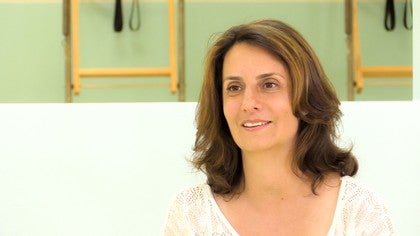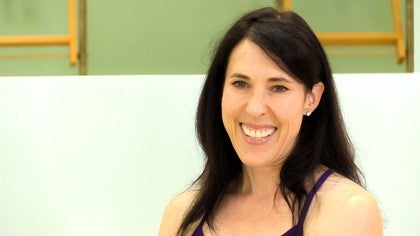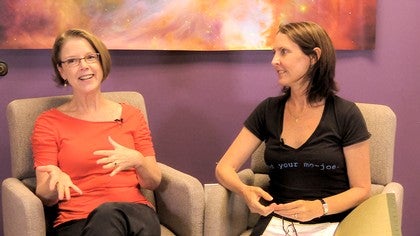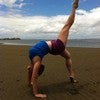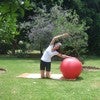Description
About This Video
Transcript
Read Full Transcript
I'm Elisia on Garrow. Um, I've been in the [inaudible] field for a long time now. I own a studio called [inaudible] that used to be Tribeca body works and was one of the early studios in Manhattan. Um, and, uh, I studied with Ramana, Chris and Asco. She wasn't my first teacher, uh, starting in 93 or so. I came to Baladez initially as a young dancer. I was a student at the School of American ballet and I had injured my foot. I actually had a weak foot. I still have that weak foot. And, uh, they sent me, um, to [inaudible] originally I was sent to a studio called Anderson Castle cove, which was in the tradition of Corolla tree or, and, and not Romana.
So that wasn't my first exposure to [inaudible]. And I went there for, for quite some time. And, uh, sometime during the course of those years, the School of American ballet actually changed their, uh, relationship with referring studios, referring physical therapists, and ultimately sent me to the plotting studio. Uh, and that was a few years later. And that was my sort of first exposure to Romana style plot is, although I still hadn't, hadn't met her yet. Uh, when I went to the plotty studio, I studied with Steve Giordano and he was my first teacher there. And my first exposure to that sort of very classical regimen, or although there were, they're both very classical, it was just a, a more, um, ordered regimen that I had been used to. So ultimately, I, I wanted to train to teach and to Steve said, well, you have to go to Ramana. So he sent me, I was motivated to start teaching [inaudible], uh, for a variety of reasons. I had been, um, I was coming to the end of my ballet career. I had done plays throughout my dance career. I stayed in touch with [inaudible], whether I was in New York, I had danced, uh, in Cincinnati.
I had danced in New Orleans, uh, and always continued to do plots, all kinds of polarities. Um, when I came back to New York and thought, well, what's next for me? I, um, was drawn to, to physical therapy and knew that I wanted to go to school for that, but I didn't know how I would fund it. Um, and I had taught intermittently taught dance for four times. So I continued to teach. I taught children ballet. I taught at the Feld School for Awhile. Um, and then I thought, well, I think maybe [inaudible] is something I would also enjoy teaching. So, um, I started to explore what that would look like. I think at the time there were a few choices in New York City. Uh, none of them were very structured. Um, and when I, when I finally decided to go and meet Romana and talk about, uh, a training program, uh, it was a big step for me, but I never thought it would be the thing I would do. I didn't do [inaudible] as this sort of, this is what I'll do.
I did it to put myself through school thinking this'll be a respectable way to earn a living rather than waiting tables, which is hard on the feet and keeps you up late. So that's, that was my initial inspiration for, for beginning to teach you, I'm even fuzzy on the dates, but I think it was around 92 93 when I certainly began the training. I know that I got my certificate very late and it was in 95 and I had been at, you know, jabbering about getting it for four some times. I think it was around 93 that I first went up there. My first impression of Romana was that this was a deeply funny woman. She was on the floor in her element.
When I arrived at what I call the ivory tower on 57th street. I came off the elevator and I was told to go there at one o'clock because she finished teaching at one o'clock and that she would meet with me. Um, but I peeked around the bend at the time the, the gym was situated to a, with a large wall on a seating area in front of all of the reformers. And, um, I peeked around the bend and saw her, you know, yucking it up with a bunch of people and, you know, uh, conducting herself in her signature way and thought this is a very funny woman. And when she finally came around the bend to meet me, she seemed to sort of stiffen and put her professional look on. And I thought, oh no, that's not hard at all. That's just some, that's just some suit she puts on, you know, for a show. So the ivory tower affectionately I call a was Dragos gym, um, and it was a hub. Then I remember walking in and thinking, this is a crazy place. And also that it wasn't [inaudible] because when I, when you first got off the elevator back in the day, uh, there was a whole gymnastics arena at the very front, uh, happening in eyesight, direct eye line of the elevator. So people were doing gymnastics, classical gymnastics that the parallel bars, you know, tumbling, um, and a lot of people, very dedicated, hard working people. Uh, and the plot is, was sort of in the back, you know, like the dirty little secret of the gym and Drago held court Drago himself at the, at the desk, which had a paper schedule or as it should have an a, an a telephone, but I think no answering machine. Um, and the lockers around the bend were these cloth bags that everybody kept their sweaty clothes in on little nails on the wall and no one dared used the shower because it was just not to be used, really inhabitable in any way. Um, and but the gym itself, the floor of the gym was incredibly busy. Uh, at the whole morning was just packed with people running around the floor, teachers running around the teachers would often answer the telephone.
So my impression was that this was a busy and happy and fun place to be. And I, and I definitely wanted more of it having been exposed to a much tamer, sort of quieter one-on-one bloodies experience. I was ready to dive in. My personal experience with Romana was extraordinary. I, when I first met with her on the very first day, I sat down and we sat down in the couch area, the lounge area as it were, and I said I wanted to teach. And she got up and left the area. She walked away and she came back with, uh, a card, the card that many of us at our studios model today, which is the list of all the exercises. And she showed me the card, she flipped it over to the back. She knew that I had been for a while already. And uh, she said, here's the mat.
Come back tomorrow at 7:00 AM you'll teach the mat. And it was one o'clock in the afternoon. And I was like, that's not that much time. But immediately I sensed from her that this wasn't a woman that you said no to, that you did what you were told or you weren't getting in. And I was not going to blow my chance. So I went home and you know, pulled an all nighter and I said, this is going to stank, but I'm going to do it. And I showed up at 7:00 AM and taught a really lousy mat class, but I did it and I figured it, this is the worst it'll be.
So let's just get this over with. Um, and it was really trial by fire and I learned from her very early on that you, you really can't pussyfoot around anything. You, you go in, you take a risk, you give it your all. If it stinks, it stinks. But the only way out is through. So you really have to go through it. And uh, she, she inspired so much of my teaching that way. Um, watching her, watching later apprentices come into the program, you could sort of tell who was going to survive and who wasn't just by their demeanor, you know, if you were timid, if you answered a question with, well I'm not sure if you, oh, I don't know if I should. She had no tolerance for that. She was okay moving on. Next person next. So I, um, I really admired that about her, that she was sort of take no take, no prisoners approach in her teaching. And it inspired me to be a better, a better teacher of also a better practitioner.
I wanted to be a good practitioner so that I could deliver the method, uh, to my students and be an inspirational teacher. So, um, as a teacher, as a person that take no prisoners as a mom, that take no prisoners approaches is really helpful. And knowing when not to use that is also really helpful. Here's one of my favorite stories about how Romana inspired me. I was a expecting a baby and I had, uh, just shared the news. So I was probably six or seven weeks along and I showed up one one morning for my regular session and I'd been out of the fold, already had been teaching, I had my own studio. Um, and it, I got to the reformer, I started to do my workout.
I had mentioned to Shari that I was expecting, I mentioned to Romana, there was congratulations all around the place and I, um, got to the long box and I put the box on and I looked at Romana and she looked at me and I said, pull straps. And she said, are you still sleeping on your stomach? And I said, yes. And she said, lie down. And so I mounted the machine confidently and from across the gym I heard a shriek, mother, mother, you said never mother never put unexpecting woman on her stomach. And Romana said, that's right. You never put an expecting woman on her stomach.
She's my client. She knows her body. I know her do the pulse drops. And I did. It's not the the, the, the fact that she made me do the Poles drops or the exchange she had with another teacher in the room. But for me, Romana was a bit of an intuit. You know, she went with her gut on many things. She went with all of the information available, not just the script or what the book said, but who is this person? What is their experience? And that's what makes a great teacher.
I think she could have taught anything. I don't think it mattered that it was [inaudible]. That what made her great is that she was a great teacher. She was an intuit. She, she could feel what was going on with you. She used very few words. She could have taught gymnastics, she could have taught a foreign language.
It wouldn't have mattered. You know, she was just a great teacher, a very demanding teacher and one you wanted to please. And that's what a great trainer does. They make you want to please them. You want to make them happy. And I always wanted to make her happy. And everyone I've ever seen work with our wanted to make her happy. So I'd like to inspire my clients that way. And I hope that, you know, they, they feel that way in, in, in our sessions.
And I think that's probably the biggest inspiration she was to me. You know, she was also really as a, as a woman, she's also really put her family first. And it was interesting to see how she held court, uh, in that jam with such a t attendance and, um, and tenderness to her family. You know, she, she put them before everything. And I think that that is a very hard thing to do. And for a woman of her generation to have straddled that sort of running a business and you know, taking care of her family was pretty inspirational. I'm not sure how many people were, we're looking at that at that time. It was, it was an interesting time, a pivotal time that was happening up there when I was there where I had a session every day. I had Romanos hands on me every day, showed up at 7:00 AM, had a session, stayed there until one Pedro go $45.
I believe it was kept track of my hours. Um, and I was caught in an odd transition because I was there at the time when the plotty studio and Sean Gallagher were in the fold, but I had begun before they were. So I actually did my sort of traditional apprenticeship with Ramona and then also had to go do this 12 day intensive up at SUNY purchase with, uh, Carol Dodge Baker who ran the 12 day. Um, and then write a check for some undisclosed amount to Sean for the balance of something that I hadn't paid. Drago so I was really in the middle, but it was a pivotal time in that Rwanda was there every day. I think she was at her peak at that time. Uh, and I had her hands, you know, on me every day and later in the police culture, it became a sort of given that you shouldn't lay hands on people and people own their own workout. And I, I believe that. But the ability to lay hands on someone and give them tactile information and extract what you want as a teacher is just so valuable. I don't know how, I don't know what kind of teacher I would have been, uh, without that input. So that was extremely influential for me. You know, her touch felt uplifting. You know, I always, I teach communication a lot in my, with my students, with my, the teachers that I mentor, um, and also in my house. But it is a, uh, a strategy that she always used, which is she never told you what not to do.
She hardly ever said, no. She just told you what to do. Do this more of this without all of the negatives. So in her sessions you felt that you really could do it all, you were invincible and if you weren't, you were going to try to be. That was, uh, it was a really special time up there from Ana's. His greatest contributions to plot his method are probably, uh, her students. Um, she, you know, it's a tree almost working downward, but you know what, she's contributed the most to have this incredible pool of talent that is dedicated to carrying on the work. Um, I think there are, I'm sure all of the elders have in some way, I'm just mostly connected to this one, but it does seem that there's an inordinate amount of people that came out of a very small period of time and the plot is history may be 10 years or so that have made a vast contribution to the field.
So I think the greatest contribution was really, you know, the passing on of her, the information she had to her students one day story time, one day, uh, Romana decided we should run around [inaudible] gym. And I'm not sure how many teachers could get a group of people to do this, but we stood up at the end of a class, a group class, and we ran the entire, it had to be quarter mile, ran the circle and we ran and she said faster and God help us. We ran faster. And then at some point she said, skip, now skip. And I skipped as a high and hard as I can. And I thought, what kind of power of this woman has over all of us? She's the puppet master. All these grown adults skipping their hearts out.
I couldn't have skipped any higher as though I were reaching for the golden ring on the ceiling. Um, I think that her unique power just came from this ability to tap into something you want or something her clients wanted to be, that you could see yourself doing things you otherwise couldn't. But in her hands you could, or under her tutelage or with those words, you could do those things. And so you sort of leave there and go back to your mundane life. But in that 45 minutes, including a shower, you are just a rockstar. And so I think that that's incredibly powerful. It's incredibly powerful.
I just, if I inherited or learned a bit of it, I am humbled and there it is again. And you know what? Everybody did laugh. They laughed because she's funny. She was really funny. I think that's forgotten. She's, she's, um, I think she's perceived as far more serious than she was in my opinion. Ramana believe that the plot is method should be executed, uh, according to a very ordered series. Um, she certainly felt that she had been charged with passing on a, uh, a heritage, um, upon upon discharge I'd say, or upon graduation. I know many of us were asked to promise to make a promise, promise me that you and she did with me as well.
Promise me you won't teach anything else other than what you've learned here. And, um, we all, you know, obeyed and took it seriously. And I think most of us had tickets seriously. But the fact that she felt obliged to, to extract that promise speaks to her a belief that this method should be carried out this way. She believed it. She felt it was true. I don't think she felt that this, she was spinning her wheels.
She felt truly that this was how the method should be preserved. And, and I think that, you know, she took seriously the fact that these people were going out in the world with, you know, her baby Joe's baby, putting your stand and what I mentioned earlier about how certain people shouldn't teach things, but she felt that she could teach things in her role, reinforces the fact that she felt responsible for passing on her, her, you know, understanding of the method to so many people. I think she took it very, very seriously. And I think that's probably when she put on that stiff professional look. Um, because she did feel responsible for the future of glottis. And I think at some point it got bigger than she thought it would. And that probably scared her because things started to unravel in the whole plot his world as they knew it. Um, and I think the tone up at that gym after that distinctly changed.
I think the trademark trial effected Romana in both positive and negative ways. I don't, you know, she's such a free spirit and I don't believe that the structure that she entered into a positively impacted her. I think she probably found it restrictive and longed for the days when, you know, things were different and, uh, clients didn't have to be booked or you could make up prices. You know, things were were just different a few decades before you could make up the rules as you went along. And, uh, as we came into this new platas generation, uh, things became very structured. Things like manuals. I remember, uh, sitting on the floor in my apprenticeship and seeing other apprentices with manuals or me having a manual and hearing how they, uh, had disdained for Romana said, get up. You know, you have to do it. You can't learn anything looking at a book. Um, so I know that the, the way the industry was going and just the fact that it was becoming an industry wasn't something she was probably comfortable with already at that decade of, of her life. So when it came time for things to, you know, blow up, I wonder if she wasn't grateful that she was able to sort of extricate from the, the confines of what had become, you know, a business for her. Um, but also the business probably took quite a, quite a fall at that point that I think relationship she might have extracted from earlier. Uh, she was finally free of and, but other opportunities might not have come her way. So I think there were, there was both good and bad. Um, I never heard any wistful longing for, oh, remember the days when the trademark was in place? Um, I was up there at that point, having, having my weekly sessions.
I remember bringing, uh, my infant daughter to the sessions with me and I don't remember there being any, um, you know, a morning over the trademark at all coming directly from Drago Gym. But, but there was a sense of ease about, about this place that seemed to reflect a new found freedom. So probably on a personal level she felt relieved. And on a professional level it was like, oh, there are so many catch phrases to choose from with Romana I say each day like Ariba, um, some I teach other teachers to say, as in when you do teaser, there's really nothing to say other than sit up, lie down, sit up, lie down. So simple, you know, fewer words, more activity. Um, there were, uh, a host of freight, little stories, two, one of which I have to share, which is my favorite Romana story and just shows how humble really she was and sort of freed me up from the confines of the plots. You know, system I'd been taught, but I, I showed up for a session one day. I was doing long spine the way I had been taught by her and she ran over and whispered in my ear, I've been teaching this wrong for years.
I took check my notes last night and we don't bring the kerogen. And I was upside down with the legs over my head. And I was like, if you've been teaching it wrong for years, we've all been teaching it wrong for years, but she laughed and it was such a funny moment because it just showed her, she, it just exercise, you know, we don't all take it so seriously and we make mistakes sometimes and you can fix those mistakes and nobody got hurt in the meantime. So it was interesting to me too, as a reminder to always go back and check my notes. Also that, you know, even the people we look up to are mentors. These great, these great larger than life characters are, are fallible. There are mistakes that get made and that's, that's okay too. I remember a day that we were, uh, doing footwork and there was an apprentice next to me teaching someone footwork.
I had just started and the phone rang and back in the day, there weren't really designated desk people. If Drago wasn't there, you had to just fend for yourself. And so the apprentice ran off to answer the phone. And Romana did, wouldn't have it. She started yelling, get back here, get back here. She said, your client is doing the footwork. A teacher's role is for alignment. You set them up for everything in the footwork. By the time they do short spine, you can leave an answer the phone because they're already set up because you did your job well. She was like, never ever leave your client during the footwork and I have never forgotten it. A teacher's role is for alignment.
That is one of the most influential things in my teaching practice that I took with me that day scarred me. Never leave, never leave, ever leave during the footwork. If Romano were sitting next to me right now, we'd probably be talking about politics because she always had something to say about current affairs and she always had a very strong opinion about it. I remember during the Clinton Monica Lewinsky scandal, she came in and she made a scene. Every king and every world leader in their lifetime has had a concubine. I don't know what everyone is making such a big deal about and I was like, she's right actually. Why are we making such a big deal about this? Everybody get back to work. Um, and we talked about current affairs and politics quite a lot during sessions.
So that's probably what we'd be talking about. Not [inaudible].
Pilates Legacy Project: Discussions
Comments
xx
You need to be a subscriber to post a comment.
Please Log In or Create an Account to start your free trial.
